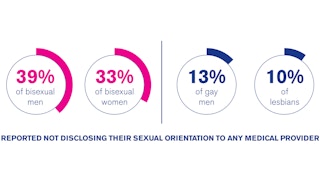
Cookies in use
Health Disparities Among Bisexual People

Far too many LGBTQ+ people face bias and discrimination when seeking health care, and as we continue to work to address this critical issue, it’s imperative to address the specific needs of people who identify as bisexual (or something similar, including queer, pansexual or fluid).
Experiences among bisexual people in healthcare settings remain rarely discussed or understood by community organizers, medical professionals and researchers.
Bisexuals face striking rates of poor health outcomes ranging from cancer and obesity, to sexually transmitted infections to mental health problems. Studies suggest that bisexuals comprise nearly half of all people who identify as lesbian, gay or bisexual, making the bisexual population the single largest group within the LGBTQ+ community –– yet, as a community, we are doing little to address the needs of bisexual people.
Moreover, transgender people and people of color comprise large portions of the bisexual community –– with more than 40 percent of LGBTQ+ people of color identifying as bisexual, and about half of transgender people describing their sexual orientation as bisexual or queer –– making these groups vulnerable to further disparities that occur at the intersections of biphobia, racism and transphobia.
Click here to download the full Health Disparities Among Bisexual People brief
- Topics:
- Bisexual
- Health & Aging
- Coming Out
Love conquers hate.
Image:
HATE WON'T MAKE US GREAT!
100% of every HRC merchandise purchase fuels the fight for equality.

